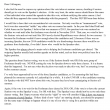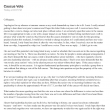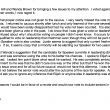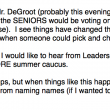UPDATE: The House Majority Caucus will re-vote on the issue of the senior vote during veto session. Members were notified by the Speaker via email on Tuesday.
JEFFERSON CITY, Mo. – Some members of House Majority Caucus are reeling following the results of a vote during the summer caucus this past weekend.
Members of the caucus present at Tan Tar A this past weekend voted 38-30 to not allow seniors to vote in the Speaker’s Race, and the blowback from that one act has led to some division among the caucus.
In an email sent out to fellow caucus members after the vote, Rep. Justin Hill wrote that he was “extremely upset that some in the caucus felt it was appropriate to take a vote with a major impact on our future without letting members know well in advance what would be voted on.”

He says had he known the caucus intended to vote on the rules for the upcoming speaker election during the summer caucus, he would have changed plans to attend.
“Instead, I only found out about it after the vote was taken,” Hill wrote. He, along with several others, did not get a vote on the matter, as they were not present. Hill called the move a disenfranchisement of the senior members, saying he did not recall any email or schedule in regard to the potential vote.
“There was absolutely no notice. No time for people to make adequate arrangements,” he wrote. “It is against fundamental parliamentary principles to exclude a group from a vote without first taking a vote of the full caucus. This brings into question not just the propriety of the vote, but also its validity.”
Rep. Wanda Brown also voiced concerns about the vote, saying that in the past, the question had never been about whether seniors could vote, but which of the two groups – the seniors or incoming freshmen – would vote.
“The question about seniors voting was to see if the seniors should vote or if the next group of freshman should vote. Never cutting the vote for Speaker down to only three classes,” she wrote in response to Hill’s email to the caucus. “It is a shame that this happened. I’m not sure when the decision was made to take this vote, but I’m assuming it was before summer caucus.”
“I’ve only been approached by two of the three Speaker candidates, so I’m assuming this had been planned (by someone currently in Leadership) for a while. It is also unfair to the candidates running for Speaker who did not know about this vote because they have been campaigning to seniors all summer,” she said.

Rep. Bruce DeGroot replied to Brown’s email, saying that he had voted against allowing seniors to vote, but now regretted his decision. But he also said he rejects the suggestion that “the candidate for Speaker currently in leadership (Elijah Haahr) knew about this vote prior to caucus and was somehow using the vote to his better his chances.”
“I spoke to Elijah after the vote but before the results were announced. I asked him point blank what result he wanted. He was completely ambivalent about the outcome,” DeGroot wrote in an email obtained by the Missouri Times. “His direct comment to me was that he didn’t care one way or the other but that if he won the Speaker’s race he get the caucus to decide this issue once and for all so future caucus’ would not have this dilemma. I was left with the clear impression that Elijah did not believe the senior vote would alter the outcome of the race for speaker.”
In a statement given to the Missouri Times on Tuesday, DeGroot simply said, “I have full faith in the Speaker of the House and fully intend to support any decision he makes regarding this issue.”
Brown called on the caucus to retake the vote during the veto session, a sentiment shared by her fellow caucus member, Rep. Joe Don McGaugh.
“I vote no. I wanted to see the seniors vote,” McGaugh said. “My thought is that a caucus vote is a caucus vote, so everyone needs to vote on the issue. So, we had the debate, and we went to vote, and the seniors weren’t allowed to vote.

McGaugh made an analogy, saying that if they were worried about the vote enough to exclude a subset, then why would they allow the Speaker candidates to vote, or allow members not seeking re-election a vote.
McGaugh noted that, prior to the vote, several seniors spoke on the issue, apparently without any knowledge that they would not be able to vote on the question of whether they should be allowed to vote in the Speaker’s election.
“I was confused two times over. It’s mind-boggling that we’re even having this discussion,” he said. “Why are we even having this debate? Who even brought this forward? Who decided that we’re not going to let seniors vote? Because I don’t recall that from the John Diehl/Caleb Jones Speaker’s race.”
That particular race seems to be the only precedent in recent times that the Republicans can look to. In that election, the question of whether seniors or new incoming freshmen would vote was put before the caucus.
“That year, we voted to have the Seniors vote and not wait until the 2014 newly elected Republicans were elected, for two reasons,” Brown wrote. “1) because the Freshman wouldn’t know enough about the candidates and 2) because if there was no incoming Speaker, the new 2014 candidates would be at a disadvantage because there would be no guidance from leadership if we didn’t know who would be the Speaker-elect.”
McGaugh noted that everyone would get the chance to vote for a candidate to become the Speaker in 2019, saying he was unsure why it mattered. That sentiment was another expressed by Hill.
“If we are just making rule changes up as we go, why don’t we hold off altogether until the incoming freshmen get to vote? If seniors don’t get a say in leadership after they are gone, incoming freshmen certainly have a right to voice their opinion for when they are here,” Hill wrote. “Without the senior vote or incoming freshmen vote, the speakership is chosen by approximately 48 out of 117. Less than half of the caucus will decide our future.”
“Hopefully, we retake the vote and get the rules right,” McGaugh said. “We can’t just fly by the seat of our pants and make it up as we go. I will stand by the decision of the caucus, but I do think we need to get it right and have the conversation when everyone can be there.”
If they are going to retake the vote, McGaugh said, then they should give notice to the members and do it. Then, during that session, a member would most likely need to make a motion to reconsider the vote, which would allow a vote to once again be taken.
View the emails below:
Benjamin Peters was a reporter for The Missouri Times and Missouri Times Magazine and also produced the #MoLeg Podcast. He joined The Missouri Times in 2016 after working as a sports editor and TV news producer in mid-Missouri. Benjamin is a graduate of Missouri State University in Springfield.
















